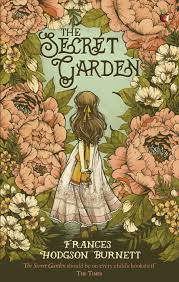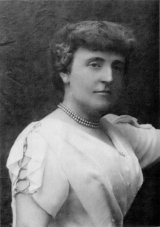The Secret Garden Page #16
The Secret Garden is a novel by Frances Hodgson Burnett first published in book form in 1911, after serialization in The American Magazine. Set in England, it is one of Burnett's most popular novels and seen as a classic of English children's literature. Several stage and film adaptations have been made.
“Well!” he exclaimed. “Upon my word. P’raps tha’ art a young ’un, after all, an’ p’raps tha’s got child’s blood in thy veins instead of sour buttermilk. Tha’s skipped red into thy cheeks as sure as my name’s Ben Weatherstaff. I wouldn’t have believed tha’ could do it.” “I never skipped before,” Mary said. “I’m just beginning. I can only go up to twenty.” “Tha’ keep on,” said Ben. “Tha’ shapes well enough at it for a young ’un that’s lived with heathen. Just see how he’s watchin’ thee,” jerking his head toward the robin. “He followed after thee yesterday. He’ll be at it again today. He’ll be bound to find out what th’ skippin’-rope is. He’s never seen one. Eh!” shaking his head at the bird, “tha’ curiosity will be th’ death of thee sometime if tha’ doesn’t look sharp.” Mary skipped round all the gardens and round the orchard, resting every few minutes. At length she went to her own special walk and made up her mind to try if she could skip the whole length of it. It was a good long skip and she began slowly, but before she had gone half-way down the path she was so hot and breathless that she was obliged to stop. She did not mind much, because she had already counted up to thirty. She stopped with a little laugh of pleasure, and there, lo and behold, was the robin swaying on a long branch of ivy. He had followed her and he greeted her with a chirp. As Mary had skipped toward him she felt something heavy in her pocket strike against her at each jump, and when she saw the robin she laughed again. “You showed me where the key was yesterday,” she said. “You ought to show me the door today; but I don’t believe you know!” The robin flew from his swinging spray of ivy on to the top of the wall and he opened his beak and sang a loud, lovely trill, merely to show off. Nothing in the world is quite as adorably lovely as a robin when he shows off—and they are nearly always doing it. Mary Lennox had heard a great deal about Magic in her Ayah’s stories, and she always said that what happened almost at that moment was Magic. One of the nice little gusts of wind rushed down the walk, and it was a stronger one than the rest. It was strong enough to wave the branches of the trees, and it was more than strong enough to sway the trailing sprays of untrimmed ivy hanging from the wall. Mary had stepped close to the robin, and suddenly the gust of wind swung aside some loose ivy trails, and more suddenly still she jumped toward it and caught it in her hand. This she did because she had seen something under it—a round knob which had been covered by the leaves hanging over it. It was the knob of a door. She put her hands under the leaves and began to pull and push them aside. Thick as the ivy hung, it nearly all was a loose and swinging curtain, though some had crept over wood and iron. Mary’s heart began to thump and her hands to shake a little in her delight and excitement. The robin kept singing and twittering away and tilting his head on one side, as if he were as excited as she was. What was this under her hands which was square and made of iron and which her fingers found a hole in? It was the lock of the door which had been closed ten years and she put her hand in her pocket, drew out the key and found it fitted the keyhole. She put the key in and turned it. It took two hands to do it, but it did turn. And then she took a long breath and looked behind her up the long walk to see if anyone was coming. No one was coming. No one ever did come, it seemed, and she took another long breath, because she could not help it, and she held back the swinging curtain of ivy and pushed back the door which opened slowly—slowly. Then she slipped through it, and shut it behind her, and stood with her back against it, looking about her and breathing quite fast with excitement, and wonder, and delight. She was standing inside the secret garden. CHAPTER IX THE STRANGEST HOUSE ANYONE EVER LIVED IN It was the sweetest, most mysterious-looking place anyone could imagine. The high walls which shut it in were covered with the leafless stems of climbing roses which were so thick that they were matted together. Mary Lennox knew they were roses because she had seen a great many roses in India. All the ground was covered with grass of a wintry brown and out of it grew clumps of bushes which were surely rosebushes if they were alive. There were numbers of standard roses which had so spread their branches that they were like little trees. There were other trees in the garden, and one of the things which made the place look strangest and loveliest was that climbing roses had run all over them and swung down long tendrils which made light swaying curtains, and here and there they had caught at each other or at a far-reaching branch and had crept from one tree to another and made lovely bridges of themselves. There were neither leaves nor roses on them now and Mary did not know whether they were dead or alive, but their thin gray or brown branches and sprays looked like a sort of hazy mantle spreading over everything, walls, and trees, and even brown grass, where they had fallen from their fastenings and run along the ground. It was this hazy tangle from tree to tree which made it all look so mysterious. Mary had thought it must be different from other gardens which had not been left all by themselves so long; and indeed it was different from any other place she had ever seen in her life. “How still it is!” she whispered. “How still!” Then she waited a moment and listened at the stillness. The robin, who had flown to his treetop, was still as all the rest. He did not even flutter his wings; he sat without stirring, and looked at Mary. “No wonder it is still,” she whispered again. “I am the first person who has spoken in here for ten years.” She moved away from the door, stepping as softly as if she were afraid of awakening someone. She was glad that there was grass under her feet and that her steps made no sounds. She walked under one of the fairy-like gray arches between the trees and looked up at the sprays and tendrils which formed them.
Translation
Translate and read this book in other languages:
Select another language:
- - Select -
- 简体中文 (Chinese - Simplified)
- 繁體中文 (Chinese - Traditional)
- Español (Spanish)
- Esperanto (Esperanto)
- 日本語 (Japanese)
- Português (Portuguese)
- Deutsch (German)
- العربية (Arabic)
- Français (French)
- Русский (Russian)
- ಕನ್ನಡ (Kannada)
- 한국어 (Korean)
- עברית (Hebrew)
- Gaeilge (Irish)
- Українська (Ukrainian)
- اردو (Urdu)
- Magyar (Hungarian)
- मानक हिन्दी (Hindi)
- Indonesia (Indonesian)
- Italiano (Italian)
- தமிழ் (Tamil)
- Türkçe (Turkish)
- తెలుగు (Telugu)
- ภาษาไทย (Thai)
- Tiếng Việt (Vietnamese)
- Čeština (Czech)
- Polski (Polish)
- Bahasa Indonesia (Indonesian)
- Românește (Romanian)
- Nederlands (Dutch)
- Ελληνικά (Greek)
- Latinum (Latin)
- Svenska (Swedish)
- Dansk (Danish)
- Suomi (Finnish)
- فارسی (Persian)
- ייִדיש (Yiddish)
- հայերեն (Armenian)
- Norsk (Norwegian)
- English (English)
Citation
Use the citation below to add this book to your bibliography:
Style:MLAChicagoAPA
"The Secret Garden Books." Literature.com. STANDS4 LLC, 2024. Web. 25 Nov. 2024. <https://www.literature.com/book/the_secret_garden_427>.




Discuss this The Secret Garden book with the community:
Report Comment
We're doing our best to make sure our content is useful, accurate and safe.
If by any chance you spot an inappropriate comment while navigating through our website please use this form to let us know, and we'll take care of it shortly.
Attachment
You need to be logged in to favorite.
Log In